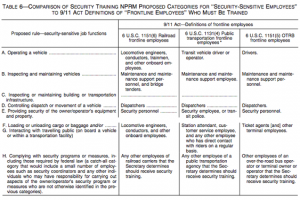The Transportation Security Administration (TSA) has submitted a proposed rule that would require Amtrak, commuter, and freight rail carriers to provide security training to their employees. The rule was part of the “Implementing Recommendations of the 9/11 Commission Act of 2007,” but it is just now being written.
As proposed, the TSA plans to divide training requirements from the 9/11 Act into four sections: prepare, observe, assess and respond (see ‘Training’ section). You will also find below a chart that outlines the types of employees that would be trained.
The TSA proposes that the rule would apply to:
- Amtrak
- Freight railroad carriers, OR railroads transporting Rail Security Sensitive Materials (RSSMs) through identified High Threat Urban areas, OR railroads that host other higher-risk rail operations.
- NOTE: this would include Class II and Class III railroads that meet the second two criteria. A total of 36 (7 Class I, 8 Class II, and 21 Class III) freight railroads would therefore be included.
- Public transportation and passenger railroads (PTPRs) operating in the eight regions with the highest transit-specific risk. This consists of 46 systems.
Overview:
The rule generally proposes that entities subject to the requirements:
- Develop security training programs to enhance and sustain the capability of their security-sensitive employees how to identify and respond to security matters.
- Submit the required security training program to TSA for approval.
- Implement the security training program and ensure all existing and new security-sensitive employees complete the required security training within certain timeframes.
- Maintain records demonstrating compliance and make the records available to TSA.
- Appoint security coordinators and alternates. These people will be accessible to TSA 24/7.
- Review and update security training programs as necessary to address changing security measures or conditions.
Highlights:
- TSA has stated that is seeking to make its regulations regarding responsibility for compliance consistent. This section clarifies that owner/operators, employees, contractors, and other persons can be held liable for violating TSA’s regulations.
- TSA will allow the use of existing security programs, such as those mandated by the FRA or FTA, to be utilized to fulfill the new training requirements.
- Employees must be trained one year after the TSA’s approval of the safety program. Annual recurrent training may be mandated for safety-sensitive employees/positions. The proposed positions are listed in the image below (see A through H)

Training:
TSA proposes that a security-sensitive employee who does not receive training cannot perform security sensitive functions unless under the direct supervision of an employee with this training. TSA also proposes a 60-day limit on this arrangement, after which the employee must be trained.
In meeting the statutory requirements for training, as outlined in the 9/11 Act, TSA divides these responsibilities into four categories that security training must address.
- The ‘‘prepare’’ category is intended to address training that may be specifically relevant to a particular job function. TSA intends for training provided under this category to satisfy 9/11 Act requirements for in-depth security training for ‘‘hazmat employees.’’
- The ‘‘observe’’ category is intended to provide knowledge to increase a security-sensitive employee’s observational skills. This category would address behavior recognition requirements of the 9/11 Act.
- The ‘‘assess’’ category requires providing knowledge of how to determine if what is observed requires a response and what those appropriate responses may be.
- The ‘‘respond’’ category includes training on security incident responses—including how to appropriately report a security threat, interact with the public and first responders at the scene of threat or incident, applicable uses of self-defense devices or protective equipment, and communication with passengers.
If you would like to read the full notice on the Federal Register click HERE.
If you have any questions, please feel free to contact the TCU Legislative Department at (301) 840-8704.
